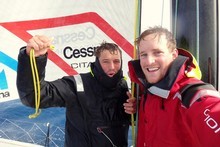Found some good news? If I didn't spot it please feel free to add it.
Well here goes - the third week of January 2012
One of the survivors had a broken leg. It later transpired that this Italian crew member, Manrico Gianpetroni, had made repeated trips inside the ship to guide passengers to safety. On his last trip he had fallen and broken his leg.
Full story at: http://www.bbc.co.uk/news/world-europe-16564789
A British sailor was plucked from the sea by his new Zealand co-skipper when he was washed overboard while changing sails on their yacht. The yacht was out of sight before it could be turned around and the Brit was left alone in heavy seas without a lifejacket. After 25 minutes the rescue was finally made and the yacht went on to win that leg of the race.
Full story: http://www.nzherald.co.nz/nz/news/article.cfm?c_id=1&objectid=10779199
It may not be the first site to produce power from the tides; the tidal barrage at the Rance River in France has that honour, but today the go-ahead was given to the Seagen generator at Strangford Lough in Northern Ireland to run 24 hours a day. This generator uses the strong current produced by the tide to turn a turbine and produce electricity. Unlike other tidal schemes there is no barrage involved. Until now there have been concernes that the blades of the generator could injure the local wildlife - seals especially. As a result the generator has only been allowed to run during daylight hours. Those fears have now been proved unfounded and the generator will run full time producing the power needed for 1,500 homes.
Full story: http://www.bbc.co.uk/news/uk-northern-ireland-16595752 and http://www.seageneration.co.uk/faq.asp
Several years ago I waited at an ATM in Scotland. The man in front of me asked for £20 and the machine threw a fit and kept pumping out money at him until he had over £200, far more than he had in the bank at that time. Something similar happened to Parijat Saha in India. He went to an ATM expecting his balance to be about 10,000 rupees (about $200) and found he had 490 billion rupees ($9.8 bn).
For someone who normally earns $700 a month as a teacher he doesn't look too happy though! The Indian State Bank is looking into the problem.
I wonder how much daily interest they are going to give him on that ultimate 'bank error in your favour'?
Full story: http://www.bbc.co.uk/news/world-asia-india-16607018
Apple launched the iBook2 textbooks today.
So why is a product launch by Apple good news?
The answer is that for years schools have regularly paid a small fortune for textbooks each year. At universities and colleges too cash strapped students have struggled to carry round weighty textbooks which cost a fortune to buy. Apple, throwing it's weight behind digital textbooks can only be good news since:
- It will encourage others to do the same
- There will be an ever increasing number of textbooks available
- The textbooks are far easier to update than a printed book
- The cost should be lower
- It will encourage the development of colour liquid paper displays
- Textbook shortages will not be a problem
- It will encourage other reading and the development of ebook readers
- Authors will make more money
- A single e-reader can hold an entire student library
NEOShield stands for Near Earth Object Shield and this project could mean the difference between the survival of humanity and humans going the same way as the dinosaurs.
Throughout the Earth's history our planet has been bombarded by objects from space. On average there's a major impact every 2,000 years where a rock from space produces a similar effect to a nuclear detonation. Every few million years a much bigger object hits and an ELE occurs (Extinction Level Event). 75 million years ago one such event wiped out the dinosaurs.
We've seen the films but so far little progress has been made in protecting ourselves from an ELE. The dinosaurs didn't have the ability to do so but we are now at a level of technology where we might be able to protect ourselves. All we need is the funding and the will to do something before it's too late.
Today we got that funding from the EU and a program drawing on expertise in Europe, the US and Russia will start investigating what we could do.
Full story: http://www.bbc.co.uk/news/science-environment-16651642
Again two odd subjects for good news but...
 |
| My 11 year old car and, still serviceable, 19 year old car |
A car is considered to be the second major purchase we make in life. We spend thousands on them and for years we've thrown them away after just a few years. This is a tremendous waste of resources both in terms of materials and energy.
In the past our cars have wasted a huge amount of energy and added greatly to pollution. I remember having cars which were rust heaps within five years too. That is no longer the case!
An eleven year old car today is reasonably fuel efficient, mechanically sound and rust free. There is no need to throw it away!
Full story: http://tiny.cc/s5nvo
And finally...
The normal pattern of events is:
- Extremely venomous snake bites human.
- Human dies
- Snake escapes.
Not so in this case. In South Africa a farmer was bitten on the toe by a puff adder. It wouldn't let go. The farmer's dog, a Jack Russell terrier, bit the snake and killed it. The farmer was rushed to hospital, was treated and survived. She even kept her toe. The dog is being treated as a hero.
Puff adder venom is cytotoxic (tissue destroying). An untreated bite can cause an edema (extensive watery blood oozing from the puncture wounds) nausea, vomiting, swelling of the lymph nodes, necrosis, gangrene and can often be fatal.
Full story: http://www.news24.com/SouthAfrica/News/Dog-kills-snake-which-bit-owner-20120121
Take a touch of humour, add some genetic science and nanotechnology. Steep with conspiracy and stir in murder and despair. Season with romance between three people in a secret location. Garnish with morality.
The result is 'A Vested Interest', a novel series by John and Shelia Chapman
|
|||







No comments:
Post a Comment